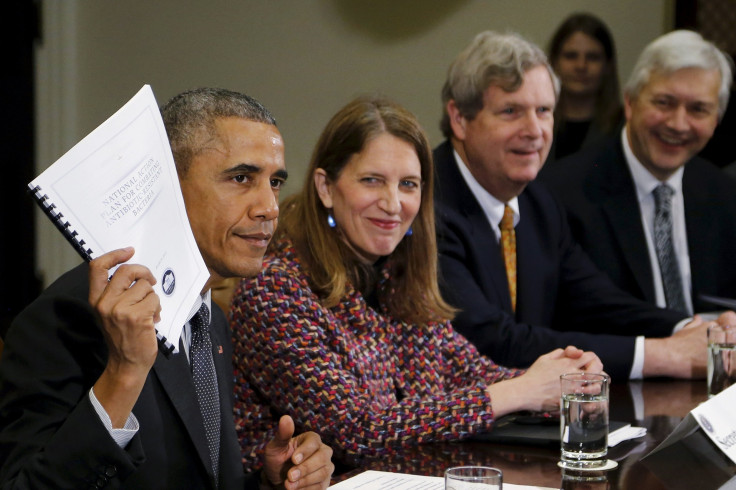Obama Hosts Antibiotic-Resistance Summit To Curb Overuse: 5-Year Plan To Prevent 2 Million Infections A Year

Convening today at the White House, the Forum on Antibiotic Stewardship brings together more than 150 representatives of companies, retailers, and human and animal health organizations committed to implementing changes over the next five years. The intention, as spelled out in President Obama's plan, is to reduce and conserve antibiotic use in order to slow the emergence of resistant bacteria and prevent the spread of resistant infections.
Every year two million people become ill and 23,000 people die when infected with antibiotic-resistant infections, estimates the Centers for Disease Control and Prevention (CDC). Such infections are caused by bacteria which have become immune to antibiotics due to overuse of these life-saving drugs in both animals and people. Prevention, the very first step in the war against antibiotic resistance, begins with hand hygiene.
The problem of antiobiotic resistance “affects every community and potentially every patient,” stated Dr. Tom Frieden, head of CDC, in his remarks during the forum's introductory session. He added that attention to this problem is necessary, otherwise “we risk undermining our ability to care and to cure."
Intertwined Issues
Animal health is human health, noted Tom Vilsack, secretary of agriculture, in his forum address. Vilsack also stressed the need to develop new animal-only antibiotics in this “long and difficult battle” that cannot be waged alone. Other officials, including Amy Pope, the deputy Homeland Security advisor, noted the necessity of unified action and the creation of antibiotic alternatives.
Global animal health company Elanco, a division of Eli Lilly, immediately rose to this latter challenge. President Jeff Simmons said Elanco, which reported $2.15 billion in sales for fiscal year 2013, has redirected two-thirds of animal pharmaceuticals budget to discovering “non-antibiotic” alternatives, including vaccines, immune modulators, and enzymes.
“We have 25 candidates in our pipeline that are non-antibiotics, and our goal is to deliver 10,” said Simmons (as reported by National Geographic).
Declarations of organizational transformations peppered the conference proceedings. Dr. John P. Holdren, President Obama’s main science and technology advisor, told the forum the White House already has begun serving only meats from animals raised without hormones and antibiotics. Holdren also noted government procurement will move in the direction of a stricter standard: antibiotic-free. Previously, government meat-purchasing practices included animal-only antibiotic use or judicious antibiotic use.
Sylvia Burwell, head of Health and Human Services, offered a financial incentive in the form of a $20 million federal prize for a point of care test to rapidly diagnose not only the organism causing an infection but also the drugs it is resistant to; such a test would help doctors prescribe the appropriate drugs.
“This is not just about numbers, it is about people, too,” said Burwell in her introductory remarks.
Burwell also publicized the final version of the Food and Drug Administration’s Veterinary Feed Directive, originally announced in December 2013. This regulation requires livestock producers to consult veterinarians before using antibiotics, instead of simply purchasing antibiotics over-the-counter and using them without advice.
Since penicillin was first discovered in 1928, antibiotics have saved the lives of millions of people around the globe. Drug-resistant bacteria not only undermine our ability to treat bacterial infections, but also our ability to practice much of modern medicine. Without these life-saving drugs, surgery, chemotherapy, dialysis, and organ transplantation would become impossible.
Among the many proposals for solving this serious health issue, Pew Charitable Trusts said it will partner with the CDC to identify scientific challenges that pose obstacles to antibiotic discovery efforts and develop a roadmap for overcoming them. Meanwhile Consumer Reports announced its upcoming investigative series on antibiotic resistance, including overuse and misuse.
“The best treatment is not the most treatment — it is the most appropriate treatment,” commented Frieden.
Published by Medicaldaily.com



























